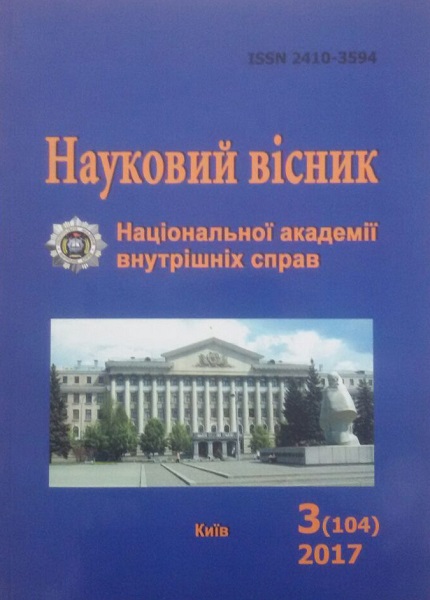LEGAL ASPECTS OF IMPLEMENTATION OF THE FORMS AND METHODS OF INTERACTION BETWEEN THE NATIONAL POLICE OF UKRAINE AND OTHER PUBLIC ADMINISTRATION BODIES IN THE COURSE OF ANTI-TERRORIST OPERATION
Keywords:
forms, methods, interaction, public administration bodies, area of anti-terrorist operation
Abstract
The article deals with the problematic issues associated with the implementation of forms and methods of interaction between the National Police of Ukraine and public administration bodies in the course anti-terrorist operation, as well as solutions and suggestions on improving the legislation of Ukraine.
Downloads
Download data is not yet available.
Abstract views: 75 PDF Downloads: 37
How to Cite
[1]
Yarovyi, K. 1. LEGAL ASPECTS OF IMPLEMENTATION OF THE FORMS AND METHODS OF INTERACTION BETWEEN THE NATIONAL POLICE OF UKRAINE AND OTHER PUBLIC ADMINISTRATION BODIES IN THE COURSE OF ANTI-TERRORIST OPERATION. Scientific Herald of the National Academy of Internal Affairs. 104, 3 (1), 75-85.
Issue
Section
Combating crimes: theory and practice
- Authors reserve the right to authorship of their own work and transfer to the magazine the right of the first publication of this work under the terms of the Creative Commons Attribution License, which allows other persons to freely distribute published work with mandatory reference to authors of the original work and the first publication of an article in this magazine.
- Authors have the right to enter into separate additional agreements on non-exclusive dissemination of the work in the form in which it was published in the journal (for example, to post an article in the institution's repository or to publish as part of a monograph), provided that the link to the first publication of the work in this journal is maintained.
- The journal's policy allows and encourages the posting of articles by authors on the Internet (for example, in electronic storehouses of institutions or on personal websites), both before the submission of this manuscript to the editorial office and during its editorial processing, as this contributes to the creation of a productive scientific discussion and positively affects the efficiency and dynamics of citing the published work.




